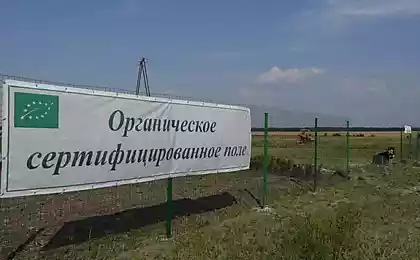697
Law on organic production on the way
The Russian government is discussing the fifth version of the bill on the production of organic products. When he was accepted, only registered manufacturers will have the right to place their products on the packaging the word "organic».
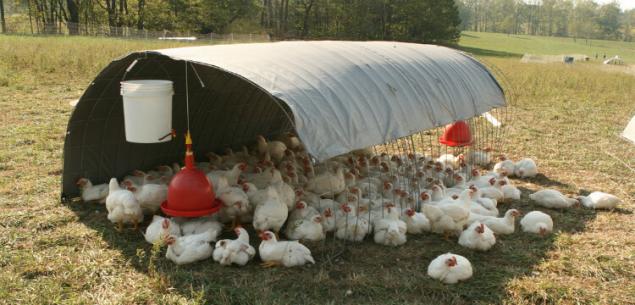
Hens on an organic farm, 2007
The Russian government is once again discussing the law on the production of organic products. This small document containing just a dozen articles have been developed in the fifth embodiment, the first of which appeared in 2012. The main controversy unfolded between officials, which are incorporated into the norm on compulsory registration of producers of organic products, and by the producers themselves, who would like to register as part of a self-regulatory organization.
In addition, the Ministry of Finance greatly alarmed about the presence in the draft articles on state support for producers of organic products - no matter how wrong squandering budget
. The result of the discussions is quite expected. First, entrepreneurs officials won: from the last version of the document had disappeared, even the mention of the participation of associations of agricultural producers in the development of organic production, although in the first version of the document the issue was discussed in a separate article - Art. 6. Secondly, the Ministry of Finance has won all mention of state support has been reduced to a modest stating that it is the producers of organic products will be provided, along with other agricultural organizations.
As a result, the basic meaning of the bill came down to the fact that organic products receive a special label, which can be used only to producers who have registered and certified by the authorized state body (most likely, it will be the Ministry of Agriculture).
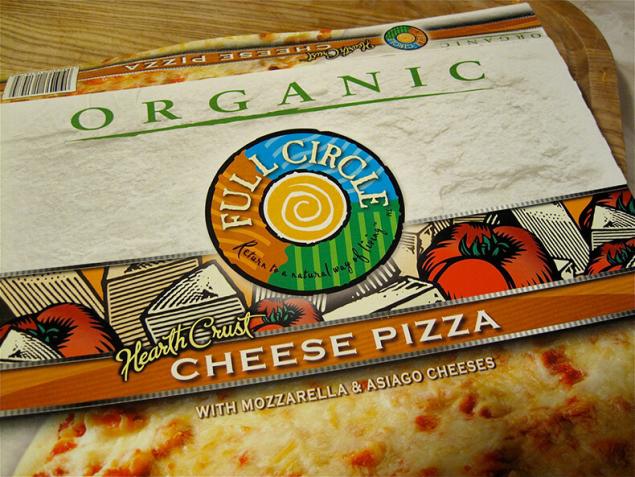
Organic pizza. 2009
Manufacturers of organic, naturally were not satisfied, but the potential consumer of this law, nothing else is necessary. Because now marked as "organic" on their products put all and sundry. Although, as noted in the explanatory note to the bill, "because all these products really organic is only 2%." After the adoption of the law this outrage come to an end.
Organic Standard
Paradoxically, when the booming fashion for organic products, a clear idea about what it is in Russia did not exist until recently. But from January 1, 2016 began to operate national standards for organic products - GOST R 56508-2015 "Production of organic production. Rules of production, storage, transport. " In this document, eight pages of dozens explained in detail which products have the right to be called organic.
In particular, organic products must be produced without the use of agrochemicals, pesticides, antibiotics, hormones, and plant growth stimulants and animals. Organic plants should be grown in areas remote from contaminating objects - roads, factories and so on. Fully prohibited the use of nitrogen fertilizers and hydroponics (growing plants without soil in the substrate with the nutrient solution). Of course, the possible use of genetically modified plants.
For weed control can be used only mechanical weeding or burning, but - no chemicals. For the treatment plant can not use synthetic drugs, and pests are allowed to fight with the help of birds, insects or bacteria.
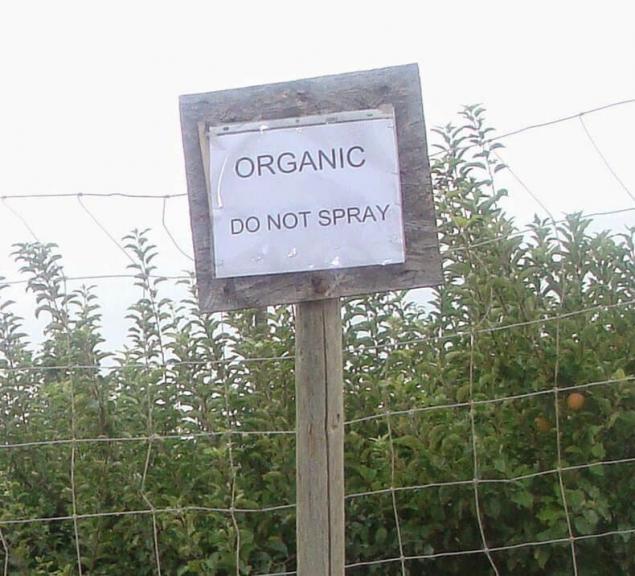
Organic farm in the United States. 2009
In animal feed only allowed to be used, resulting from organic production. Cows, pigs, chickens and other animals should be provided with long-term exposure to fresh air.
In the production of organic food processing agricultural raw materials must be carried out "essentially biological, mechanical and physical methods." Of course, the raw material is allowed to use only organic, flavorings -. Only natural
According to GOST, "organic foods must contain in its composition at least 95% of the organic ingredients of agricultural origin (excluding the mass of salt and water)." Packaging of organic products must have a minimal negative impact on production and the environment, the use of polyvinyl chloride is not allowed for it (PVC).
And the thick-thick layer of litter
Along with clear technological requirements in GOST for organic products attract attention demands moral and ethical. About fact, the owner are obliged to make the lives of farm fowl most happy: "Throughout the life of the animal, including at the time of slaughter, any suffering, including surgery, should be kept to a minimum»
. Prohibited animals in isolation and "tail docking, obkusyvaniya fangs shortening of beaks and dehorning." Not to mention the fact that a thick layer of litter for pigs must be provided, in which they could dig your pleasure.
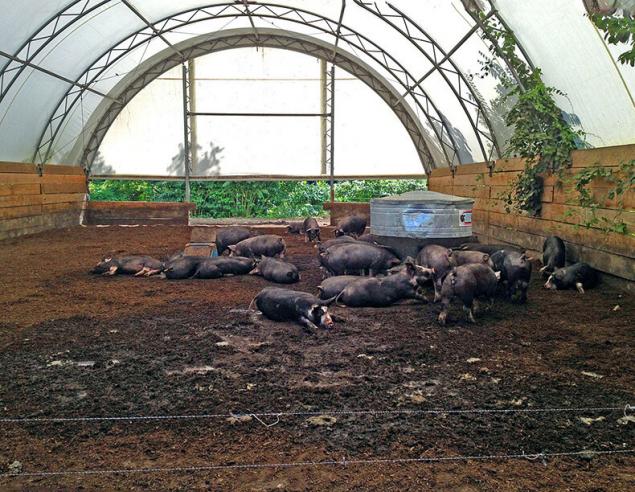
Pigsty on an organic farm. 2013
Such requirements - a tribute to the history of origin of organic production, which is usually count since 1924. Then the Austro-German philosopher Rudolf Steiner offered the world the concept of biodynamic farming in the work "Spiritual-scientific foundations of the successful development of agriculture." After the Second World War in Europe and the United States began to emerge movement of organic production, based on the ideas of Steiner, and in the sixties, his philosophy was very popular in the hippie environment.
However, the really massive cult of organic production began to develop in the eighties, in the wake of the global "green" movement and the promotion of a healthy diet. By the mid-eighties in many developed countries have already developed clear and unambiguous criteria on which farming and its products can be considered organic.
The main demand - to minimize the reduction of damage to the environment and reduce the use of artificial materials. In this case, the details of national standards vary greatly. For example, in France, have restrictions on noise pollution grazing dairy cows - Cows should not be nervous
! Over the past 15 years - from 1999 to 2015 - the world market for organic products has grown six-fold from $ 15 billion to $ 90 billion
. According to the International Federation of organic agriculture movements (IFOAM), in the last years of the last century organic agricultural production has grown by 10-15% per year, compared with 2-3% growth in traditional agriculture.
Fads rich
96% of the world's organic matter is consumed today in the US, Western Europe and Japan. Even during the crisis the number of people in developed countries who are ready to pay more for organic products is growing under the influence of constant talk about the dangers of "industrial" agricultural products.
Demand creates supply - the number of countries and companies that produce organic products is constantly growing. In the development of agricultural production, explicitly prohibiting the use of expensive chemicals and machines, saw for himself the chance to underdeveloped countries. As a result, most organic producers were registered today in India, Uganda and Mexico.
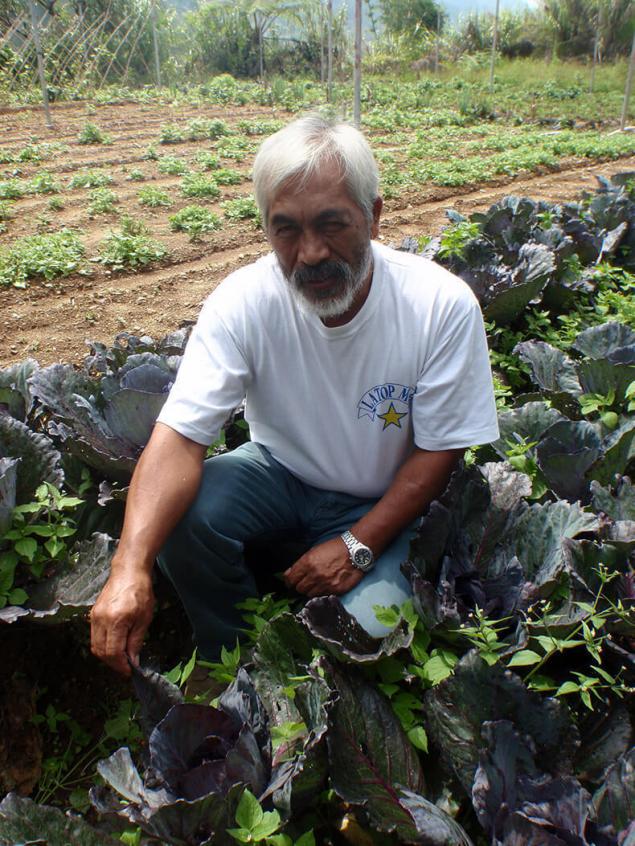
The organic farmer in the Philippines. 2011
Russian farmers and government officials also wanted to get into their number - as noted in the explanatory note to the bill on the development of organic production in our country, more than 40 million hectares of arable land for many years, not processed, and therefore can be an excellent basis for the development of organic production .
However, enough of the skeptics. They indicate in particular that due to the short shelf life of organic products, particularly in the business role proximity manufacturer to the customer. Most regions of Russia will be unable to supply organic products for export due to logistical constraints. And the demand for these products is low in the country: in the conditions of declining revenues less the Russians are willing to pay for food two to three times more than the regular rates.
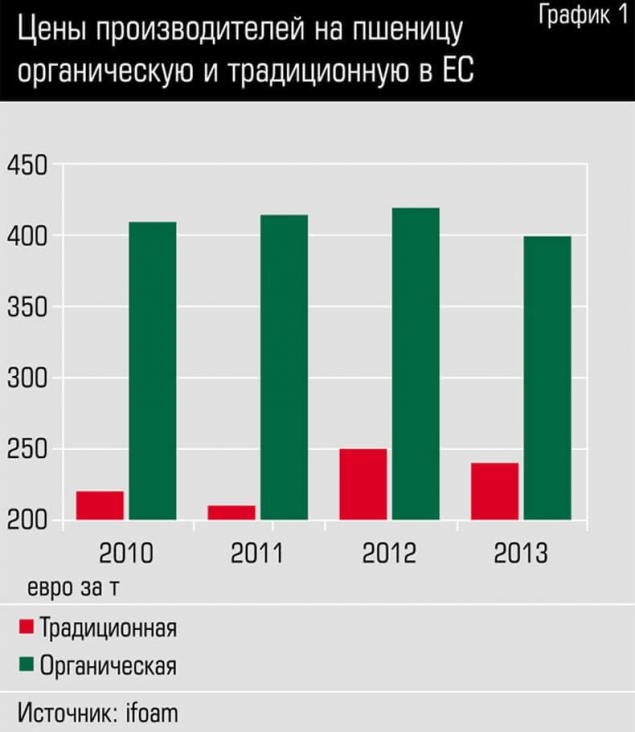
Organic products are at times more expensive than traditional
Moreover, as reported by the Institute of Nutrition, that in Russia much faster than in developed countries, a growing number of diseases associated with impaired quality of food. This is explained by the fact that more and more of our citizens are forced to increase the share in the diet of cheap flour products.

Hens on an organic farm, 2007
The Russian government is once again discussing the law on the production of organic products. This small document containing just a dozen articles have been developed in the fifth embodiment, the first of which appeared in 2012. The main controversy unfolded between officials, which are incorporated into the norm on compulsory registration of producers of organic products, and by the producers themselves, who would like to register as part of a self-regulatory organization.
In addition, the Ministry of Finance greatly alarmed about the presence in the draft articles on state support for producers of organic products - no matter how wrong squandering budget
. The result of the discussions is quite expected. First, entrepreneurs officials won: from the last version of the document had disappeared, even the mention of the participation of associations of agricultural producers in the development of organic production, although in the first version of the document the issue was discussed in a separate article - Art. 6. Secondly, the Ministry of Finance has won all mention of state support has been reduced to a modest stating that it is the producers of organic products will be provided, along with other agricultural organizations.
As a result, the basic meaning of the bill came down to the fact that organic products receive a special label, which can be used only to producers who have registered and certified by the authorized state body (most likely, it will be the Ministry of Agriculture).

Organic pizza. 2009
Manufacturers of organic, naturally were not satisfied, but the potential consumer of this law, nothing else is necessary. Because now marked as "organic" on their products put all and sundry. Although, as noted in the explanatory note to the bill, "because all these products really organic is only 2%." After the adoption of the law this outrage come to an end.
Organic Standard
Paradoxically, when the booming fashion for organic products, a clear idea about what it is in Russia did not exist until recently. But from January 1, 2016 began to operate national standards for organic products - GOST R 56508-2015 "Production of organic production. Rules of production, storage, transport. " In this document, eight pages of dozens explained in detail which products have the right to be called organic.
In particular, organic products must be produced without the use of agrochemicals, pesticides, antibiotics, hormones, and plant growth stimulants and animals. Organic plants should be grown in areas remote from contaminating objects - roads, factories and so on. Fully prohibited the use of nitrogen fertilizers and hydroponics (growing plants without soil in the substrate with the nutrient solution). Of course, the possible use of genetically modified plants.
For weed control can be used only mechanical weeding or burning, but - no chemicals. For the treatment plant can not use synthetic drugs, and pests are allowed to fight with the help of birds, insects or bacteria.

Organic farm in the United States. 2009
In animal feed only allowed to be used, resulting from organic production. Cows, pigs, chickens and other animals should be provided with long-term exposure to fresh air.
In the production of organic food processing agricultural raw materials must be carried out "essentially biological, mechanical and physical methods." Of course, the raw material is allowed to use only organic, flavorings -. Only natural
According to GOST, "organic foods must contain in its composition at least 95% of the organic ingredients of agricultural origin (excluding the mass of salt and water)." Packaging of organic products must have a minimal negative impact on production and the environment, the use of polyvinyl chloride is not allowed for it (PVC).
And the thick-thick layer of litter
Along with clear technological requirements in GOST for organic products attract attention demands moral and ethical. About fact, the owner are obliged to make the lives of farm fowl most happy: "Throughout the life of the animal, including at the time of slaughter, any suffering, including surgery, should be kept to a minimum»
. Prohibited animals in isolation and "tail docking, obkusyvaniya fangs shortening of beaks and dehorning." Not to mention the fact that a thick layer of litter for pigs must be provided, in which they could dig your pleasure.

Pigsty on an organic farm. 2013
Such requirements - a tribute to the history of origin of organic production, which is usually count since 1924. Then the Austro-German philosopher Rudolf Steiner offered the world the concept of biodynamic farming in the work "Spiritual-scientific foundations of the successful development of agriculture." After the Second World War in Europe and the United States began to emerge movement of organic production, based on the ideas of Steiner, and in the sixties, his philosophy was very popular in the hippie environment.
However, the really massive cult of organic production began to develop in the eighties, in the wake of the global "green" movement and the promotion of a healthy diet. By the mid-eighties in many developed countries have already developed clear and unambiguous criteria on which farming and its products can be considered organic.
The main demand - to minimize the reduction of damage to the environment and reduce the use of artificial materials. In this case, the details of national standards vary greatly. For example, in France, have restrictions on noise pollution grazing dairy cows - Cows should not be nervous
! Over the past 15 years - from 1999 to 2015 - the world market for organic products has grown six-fold from $ 15 billion to $ 90 billion
. According to the International Federation of organic agriculture movements (IFOAM), in the last years of the last century organic agricultural production has grown by 10-15% per year, compared with 2-3% growth in traditional agriculture.
Fads rich
96% of the world's organic matter is consumed today in the US, Western Europe and Japan. Even during the crisis the number of people in developed countries who are ready to pay more for organic products is growing under the influence of constant talk about the dangers of "industrial" agricultural products.
Demand creates supply - the number of countries and companies that produce organic products is constantly growing. In the development of agricultural production, explicitly prohibiting the use of expensive chemicals and machines, saw for himself the chance to underdeveloped countries. As a result, most organic producers were registered today in India, Uganda and Mexico.

The organic farmer in the Philippines. 2011
Russian farmers and government officials also wanted to get into their number - as noted in the explanatory note to the bill on the development of organic production in our country, more than 40 million hectares of arable land for many years, not processed, and therefore can be an excellent basis for the development of organic production .
However, enough of the skeptics. They indicate in particular that due to the short shelf life of organic products, particularly in the business role proximity manufacturer to the customer. Most regions of Russia will be unable to supply organic products for export due to logistical constraints. And the demand for these products is low in the country: in the conditions of declining revenues less the Russians are willing to pay for food two to three times more than the regular rates.

Organic products are at times more expensive than traditional
Moreover, as reported by the Institute of Nutrition, that in Russia much faster than in developed countries, a growing number of diseases associated with impaired quality of food. This is explained by the fact that more and more of our citizens are forced to increase the share in the diet of cheap flour products.


















